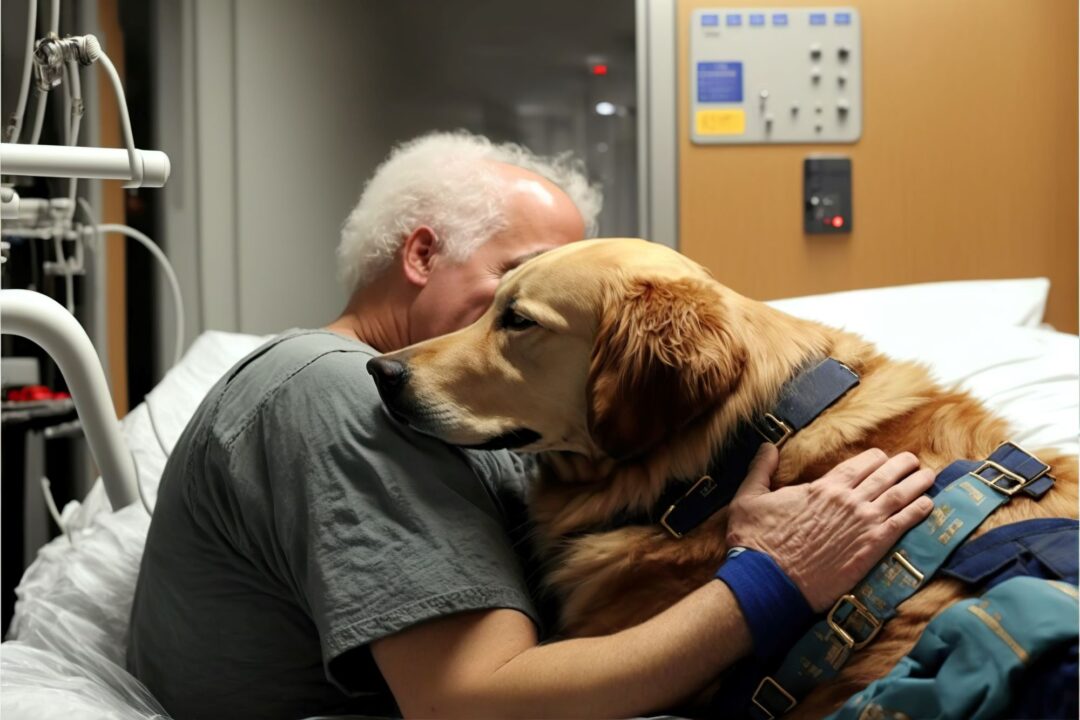General
Animal Empathy And Personal Growth: How Understanding Animals Can Enhance Self-Awareness

Last Updated on June 22, 2023 by Joshua Isibor
Empathy, the ability to comprehend and share the feelings of others, is integral to personal growth. It nurtures relationships, fosters compassion, and helps individuals navigate social dynamics.
Diving deeper, animal empathy emerges as an enlightening aspect. For those who profoundly connect with animals, sometimes termed as an ‘animal empath,’ understanding animals’ emotions can become a mirror for one’s own emotions. The main idea being explored here is that connecting with animals and understanding their emotions can play a big role in boosting self-awareness and personal growth.
The Concept Of Animal Empathy
Animal empathy refers to the capacity to recognize, understand, and share the feelings of animals. This involves being attuned to an animal’s non-verbal cues and emotional states.
A plethora of research underscores the existence of human-animal empathy. Studies indicate that interacting with animals can trigger oxytocin release in humans, often referred to as the ‘bonding hormone.’ Further, programs involving animals have shown to foster social skills and emotional well-being among children and adults alike.
Interestingly, animal empathy is not an isolated phenomenon; it reflects and enriches human empathy. Understanding an animal’s emotions can sharpen an individual’s ability to read and respond to human emotions, making it a two-way street.
The Emotional Lives Of Animals
A growing body of evidence substantiates that animals experience emotions. For instance, elephants have been observed to exhibit grief when a member of their herd passes away. Research on primates reveals the existence of complex social structures based on emotional bonds.
In addition to intra-species empathy, animals have demonstrated empathic behavior toward humans. Dogs, for example, are adept at sensing their owner’s mood and often provide comfort during distressing times.
Animals communicate emotions through a myriad of ways, such as vocalizations, body language, and facial expressions. Canines, for instance, wag their tails or bark to convey happiness or excitement. Cetaceans, like dolphins and whales, use intricate vocal patterns and physical touch.
Developing Empathy Through Interactions With Animals
Interacting with animals can be a transformative experience that enhances human empathy. Through such interactions, one becomes more attuned to the emotions and needs of everyone, including animals.
- The Role Of Pets In Fostering Empathy
Pets, especially dogs and cats, serve as prime catalysts for empathy development. Nurturing a pet entails understanding their needs and emotions. This process inculcates a sense of responsibility and fosters empathetic thinking, as individuals tend to place their pet’s needs alongside or even before their own.
- The Benefits Of Animal-Assisted Therapy


Animal-assisted therapy (AAT) boasts a range of benefits. In such sessions, animals like dogs, horses, or even small creatures like rabbits and guinea pigs, provide comfort and facilitate therapy goals. AAT has proven efficacy in enhancing social interaction among children with autism, aiding veterans in coping with PTSD, and boosting morale for long-term care patients.
- Experiences And Learnings From Wildlife Observation
Observing wildlife can also be an enlightening experience. The intricate behaviors of birds during migration, or the protective nature of a bear mother, can instill a deeper appreciation for life’s diversity. Witnessing these natural spectacles encourages a connection beyond the self, augmenting an understanding of the interconnectedness of all life forms.
Engaging with animals encourages mindfulness. The sheer act of observing a cat’s grace, listening to a bird’s song, or feeling a horse’s breath can root a person in the present moment. This grounding experience can alleviate the constant chatter of the human mind, fostering a state of presence that is rejuvenating and enlightening.
The Connection Between Animal Empathy And Personal Growth
Developing empathy for animals can lead to significant personal growth. This is because understanding and relating to animal emotions can enhance emotional intelligence, communication skills, and compassion.
- Enhanced Emotional Intelligence Through Understanding Animal Emotions
Grasping animal emotions translates into heightened emotional intelligence or emotional quotient (EQ). When individuals can discern the nuanced emotions of animals, they are likely to become more adept at recognizing and processing human emotions, paving the way for more meaningful relationships.
- Learning Non-Verbal Communication Skills
Animals predominantly communicate non-verbally. Being perceptive to an animal’s body language, facial expressions, or sounds sharpens non-verbal communication skills. This acumen is invaluable in human interactions, where body language often speaks louder than words.
- Developing Compassion And Reducing Egocentrism
Engaging with animals can foster compassion and diminish egocentrism. As individuals recognize the depth of animal emotions, they often develop a more inclusive worldview, where compassion isn’t limited to humans. This broadened perspective can reduce egocentric tendencies as one becomes more aware of the significance of all beings.
- The Impact On Mental Health And Stress Reduction
Interactions with animals have a tangible impact on mental health. The calming presence of an animal can lower cortisol levels, thereby reducing stress. Moreover, the companionship provided by animals can alleviate loneliness, which is a significant factor in depression.
In essence, animal empathy is more than a compassionate trait; it is a gateway to holistic personal growth. Through interactions with animals, individuals can enhance their emotional intelligence, hone communication skills, embrace a more compassionate worldview, and foster mental well-being.
Cultivating Animal Empathy For Sustainable Personal Growth
Through positive experiences with animals and responsible stewardship, individuals can develop a deeper understanding of the world and build stronger communities.
- Encouraging Experiences With Animals At Different Life Stages
Fostering interactions with animals across different life stages is vital. Children can learn empathy by caring for a family pet. Meanwhile, adults may find comfort in animal companionship, and seniors can benefit from animal-assisted therapy.
- Incorporating Animal Empathy Into Educational Programs
Integrating animal empathy into educational curricula is a proactive approach. Schools can incorporate lessons about animal emotions and welfare, and arrange visits to animal sanctuaries or bring therapy animals into classrooms. This exposes students to the rich emotional lives of animals from an early age.
- Promoting Responsible Animal Stewardship
Encouraging responsible animal stewardship is essential. This entails understanding that animals have needs and emotions and deserve respect and proper care. It’s about adopting humane practices toward animals, whether they be pets, wildlife, or farm animals.
- Building Community Through Shared Animal-Centric Experiences
Shared animal-centric experiences, such as community dog walks or birdwatching groups, can build bonds among community members. These gatherings not only cultivate animal empathy but also create networks of like-minded individuals who can support and learn from each other.
Animal empathy is not only beneficial for one’s personal development but also fosters a more compassionate society. It’s essential to engage with animals mindfully and respect their intrinsic value, as this paves the way for a more harmonious coexistence with all living beings.
Potential Challenges And Criticisms
While empathy toward animals is invaluable, attributing human characteristics and emotions to them can create misconceptions and unrealistic expectations. It is vital to recognize and appreciate animals for their inherent traits and capabilities without imposing a human lens on their behaviors and emotions.
While animals have emotional lives, the spectrum and complexity might not parallel human emotions. For instance, while a dog might show excitement or affection, its emotional repertoire may not encompass emotions that require higher cognitive functions, such as guilt or ambition. Acknowledging these limitations ensures a more realistic and respectful approach toward animal emotions.
Furthermore, striking a balance between animal empathy and essential human needs and priorities is of utmost importance. Animal empathy should be an extension of one’s compassion, not a substitution for human relationships or responsibilities. It should not overshadow or detract from addressing human welfare issues or fulfilling obligations toward fellow humans.
Conclusion
Animal empathy is a fundamental component of personal growth. It instills a sense of compassion and responsibility that transcends human relationships, fostering mental well-being. However, it is crucial to approach animal empathy with mindfulness and acknowledge the limits of animal cognition and emotion.
Whether it be a beloved pet, a bird singing outside the window, or the deer grazing in the distance, each interaction is an opportunity for growth and understanding. Reflect upon these experiences and consider how they have shaped or can shape your emotional landscape.
ALSO, READ How to Make Ends Meet


-



 Text Messages5 months ago
Text Messages5 months agoBEST LOVE CONFESSION MESSAGES FOR HER OR HIM
-



 Sex Education3 months ago
Sex Education3 months ago10 Simple Hack to Make a Girl Send Her Nudes
-



 Text Messages6 months ago
Text Messages6 months agoHeart Touching RIP Uncle Quotes
-



 Text Messages5 months ago
Text Messages5 months agoBest Good Luck Wishes Before and After Surgery, for Family and Friends
-



 Text Messages6 months ago
Text Messages6 months agoFreaky and Dirty Paragraphs For Him Copy And Paste Yahoo
-



 Uncategorized3 months ago
Uncategorized3 months agoHOW TO FALL IN LOVE WITH YOURSELF
-



 Uncategorized4 months ago
Uncategorized4 months agoHOW TO KISS A BOY FOR THE FIRST TIME
-



 Health5 months ago
Health5 months ago5 Unknown Ways To Maintain Skin Health